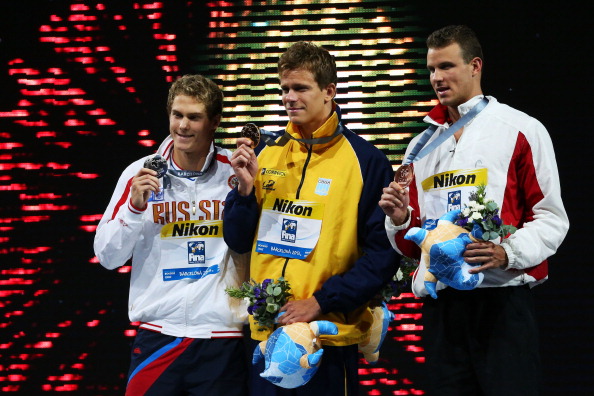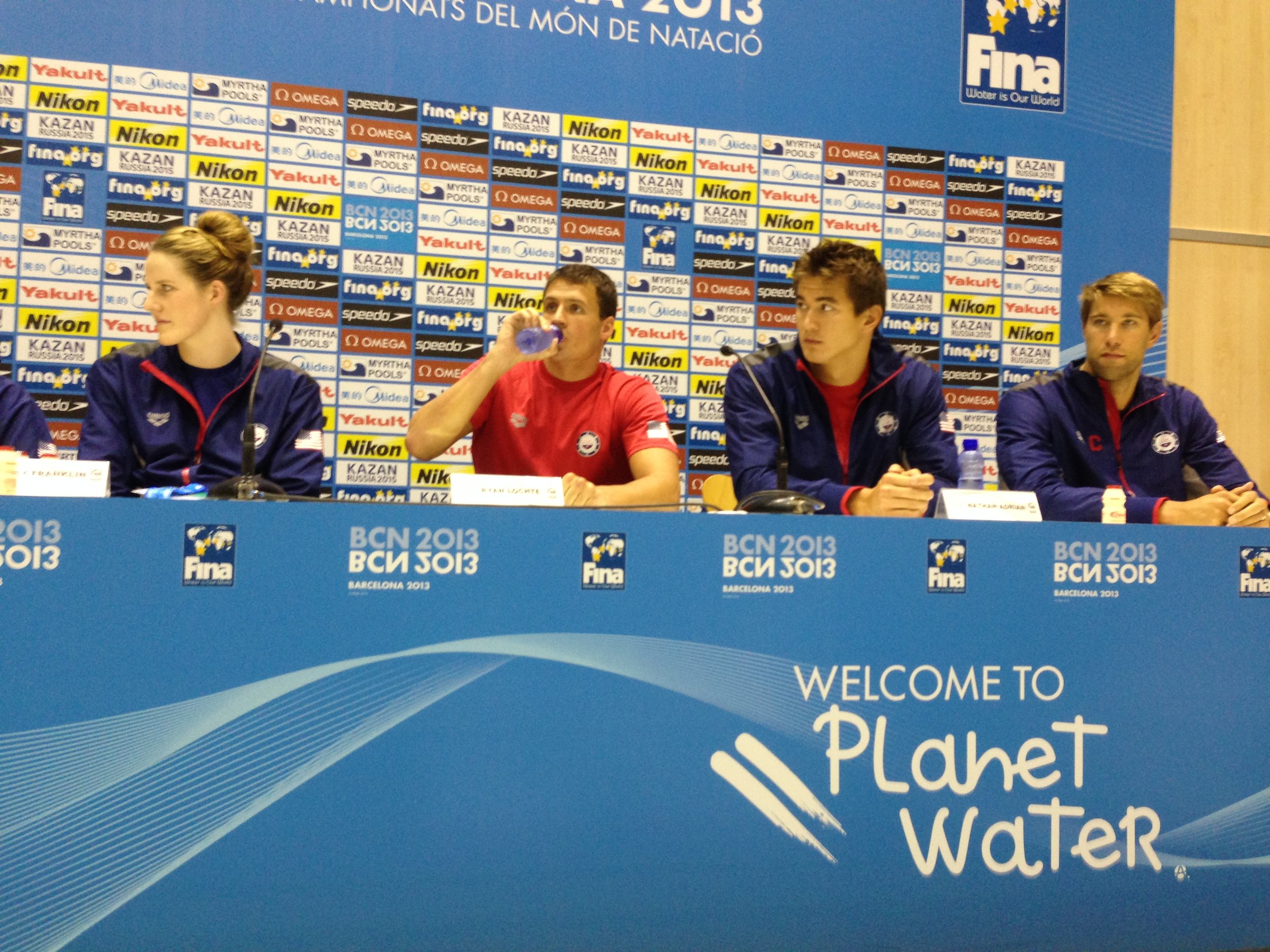BARCELONA -- No, Michael Phelps did not swim even one stroke at the 2013 world championships. Yes, his presence hung over the meet -- it being a year to the day that he touched the wall for the last time in the winning medley relay in London, as was helpfully noted in a Facebook post by the U.S. Olympic Team. Is he coming back? Who knows? Whatever Phelps ultimately opts to do, keep at his golf game or again take the plunge, these championships, which wrapped up Sunday in memorable fashion, with the bang of the medley relays, will be long remembered because -- if this is indeed the post-Phelps era -- swimming now boasts not just one super-amazing swimmer.
It has a bunch of them.
Phelps has always said he wanted, first and foremost, to grow the sport. Evidence came shining through across eight days at the Palau Sant Jordi.
American Missy Franklin, 18, won six gold medals. She joined Phelps, Mark Spitz and East German Kristin Otto as the only swimmers to win as many as six at the worlds or the Olympics. Otto won six at the 1988 Seoul Games.
Last year in London, Franklin won four golds and a bronze. She is -- at the risk of understatement -- an extraordinary talent.
At a late-night news conference, she was asked: "Missy, after all you have achieved here in Barcelona, do you start feeling like the female Michael Phelps?"
She smiled. "No," she said. "I just feel like Missy. I think that's all I ever want to be, is just Missy.
"I don't ever want to want to take after someone else, because in swimming everyone leaves their own unique mark. No one will ever do what Michael did, or how Michael did it. It has been incredible watching him. But I hope to kind of have my own unique traits that make me known for just being me in the swimming world instead of anyone else."
Franklin's immediate reaction after her final medal, a big win Sunday night by the U.S. women in the medley: she is taking a break from swimming until she shows up in a couple weeks at Berkeley for her freshman year.
The U.S. team dominated the swim medal count, with 29 overall in the pool, 14 gold. Including open water, the U.S. total: 31. Even so, these worlds underscored swimming's phenomenal worldwide growth, and the emergence of stars from all over.
For some context:
At the height of the craziness that was the plastic-suit craze, the 2009 world championships in Rome, swimmers set 43 world records. There was talk then that those marks might last 10 or 20 years.
Here, swimmers set six world records -- three in one day, Saturday.
All six records, intriguingly, were set in women's races.
Lithuania's Ruta Meilutyte, just 16, set two world records herself, in the 50 and 100 breaststroke. Her mark in the 50, in Saturday's semifinal no less, came mere hours after Russia's Yulia Efimova had in the preliminaries shaved two-hundredths of a second off the 29.8 record that American Jessica Hardy had set in 2009; Meilutyte lowered the new mark, 29.78, by a whopping three-tenths of a second, to 29.48.
Then, in Sunday's final, as if to emphasize just how brutal the competition has become, Efimova won the race, touching in 29.52. Meilutyte came in second, in 29.59. Hardy finished third, in 29.8 -- which, until just Saturday, had been world-record time.
"For her to swim so fast -- this is an amazing time," Efimova said. "But today I win. And this is great."
In Sunday's night's men's 1500, China's Sun Yang prevailed, in 14:41.15. That meant he won all three distance races, the 1500, 800 and 400 -- pulling off the distance triple that Australian legend Grant Hackett did at the world championships in Montreal in 2005.
He was named the male swimmer of the meet.
The female swimmer of the meet?
American Katie Ledecky, also 16. She also set two world records -- in the 800 and the 1500, the mark in the 1500 going down by six seconds. She also won all three distance races -- again, the 400, 800 and 1500. Moreover, she swam a leg on the winning 4x200 relay.
Ledecky said she had hoped for three wins and one world record -- in any of the three races, she said.
Though "it means a lot to me to get this award," Ledecky said, Franklin "deserves it probably more than I do" and "we are all so proud of her."
This must be understood about Katie Ledecky:
Out of the pool, she is as pleasant, charming and delightful as any model teen-ager -- who plans now to head home and apply for her driver's permit -- can be.
When she steps onto the blocks, however, she acquires -- this is meant as the highest of compliments -- a cold-blooded instinct to win.
She explained on Saturday where it comes from: "I've always had it, from the time I started swimming. When you love it, you want to do well." Comparatively, it's not a big deal to her to swim against the world's best: "When you get to a [big] meet, it's nothing new. You just compete against the girls next to you. That is what swimming is all about."
At a news conference Sunday, Ledecky was asked why it is that the world records here fell only to women.
She said, "Michael Phelps just retired. He left a really great legacy. I think a lot of great people have been inspired by him. Not just the male swimmers but definitely female swimmers as well. I think the world of swimming is really fast right now. I think the women are stepping up. The men are trying to chase some of Michael's records, which are really tough. I don't know -- it's just a handful of female swimmers that are starting to do this."
South Africa's Chad le Clos won the men's 100 and 200 butterflys, coming from behind in the 100 -- he was fifth at the turn -- just the way Phelps used to.
Cesar Cielo of Brazil won the men's 50 free in 21.32 but the race produced a new star, silver medalist Vlad Morozov, who touched in 21.47. Morozov, who moved to Southern California from Siberia when he was 14 and swam for USC in college, tore up the 2013 NCAA meet, breaking the 100-yard sprint record set by -- who else -- Cielo.
The U.S. medal count in the pool, incidentally, would have been an even 30 -- and the gold total 15 -- but for an unusual disqualification Sunday night in the men's medley.
On the first exchange, with Matt Grevers finishing the backstroke leg and Kevin Cordes jumping off to do the breaststroke, the electronic timer caught Cordes jumping precisely one-hundredth of a second too soon. The U.S. team finished the race in first place, with Ryan Lochte swimming the fly and Nathan Adrian swimming the anchor freestyle, and by more than a second -- but was promptly disqualified.
The incident was evocative of an exchange at the worlds in Melbourne in 2007, when Ian Crocker jumped off in the medley prelims exactly one-hundredth of a second too soon as well. That kept Phelps from winning eight gold medals there.
Grevers said the mix-up might have been as much on him as on Cordes, a promising breaststroker expected to be one of the world's best by the 2016 Rio Games. Adrian said, "It falls on all of our shoulders. It's up to all of us to help bring it back. I have said this before. If us four ever step up again, we are never going to have a disqualification. That's for sure."
Bob Bowman, Phelps' longtime mentor who is the head U.S. men's coach here, similarly called the episode Sunday a "great learning experience."
He urged perspective: "DQ'ing a relay in the first world championships of the quad is one thing. Doing it in the Olympics … would be 10 times worse, right?" The trick going forward: to "re-think how they're gong to react to things in this environment and just do better."
Earlier in the week, Phelps had been in the stands texting Bowman when the U.S. was racing.
Asked if Phelps had sent a text or two with some thoughts on the medley, Bowman said, "Not yet."
Then again, that was just moments after.






